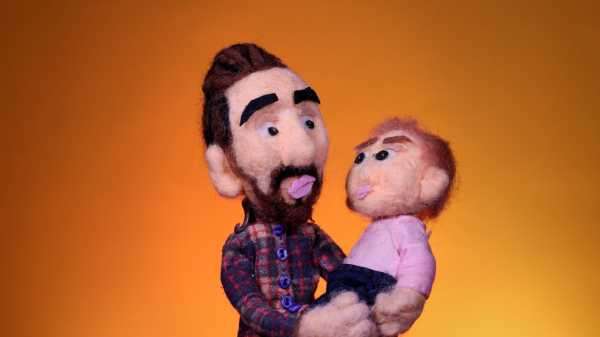
Kahn said that he still doubts whether he made the correct choice—even whether there was such a thing—but he doesn’t regret it, either.
Alex Kahn was raised Jewish—he celebrated his bar mitzvah and went to shul with his family a few times a year, for High Holy Days—but, growing up, he didn’t think much about his faith. Becoming a father in late 2020, as the COVID-19 pandemic raged, shook something loose in him that otherwise might have stayed put. As a new parent, he felt the pressure of shaping his child’s identity, but, in light of virus-induced anxiety and isolation, the customs that he might have relied on for guidance seemed suddenly strange. Faced with the decision of whether to give his son a bris—the circumcision performed on the eighth day of a Jewish boy’s life—Kahn found himself questioning the meaning of tradition in the absence of community. His deliberation process is colorfully dramatized in the short film “Dear Max,” which combines archival footage with stop-motion animation, and is scripted as a letter from Kahn to his son.
The New Yorker Documentary
View the latest or submit your own film.

Video from Kahn’s own bris ceremony, in 1988, shows a big party, complete with bagel spread—exactly the kind of gathering that was unthinkable during that first pandemic winter, pre-vaccine. Milestone-marking social occasions had been traded for dreary private micro-rituals—at one point in “Dear Max,” the puppet who plays Kahn hangs a surgical mask on a wall hook and rubs a dollop of hand sanitizer between his palms—and, stripped of the comforts provided by relatives and friends, lox and schmear, certain ancestral sacraments took on a starker significance. In the case of Max’s bris, there was nothing to distract from the odd experience of what Kahn recently described to me as “inviting a stranger over to perform genital mutilation on your kid.” The gravitational pull of tradition had already begun to decline—as Kahn mentions, plenty of parents forgo the bris, for good reasons—but the pandemic opened a decisive rupture between past and future. What relevance did an ancient convention have in this alien landscape? By abstaining, would Kahn be severing a connection to his—and Max’s—heritage?
Kahn told me that he still doubts whether he made the correct choice—even whether there was such a thing—but he doesn’t regret it, either. His movie isn’t a referendum on circumcision or religion; rather, it’s a story of love and ambivalence which honors the imperfect, human nature of parenthood. That theme was something he aimed to emphasize in his collaboration with the animation director Lizzy Hogenson, whose work he’d seen in the New Yorker documentary “Dani,” and whose tender, tactile style offered a refreshing reprieve from the slick, screen-filtered way many were left to view the world during the pandemic. “Dear Max” poignantly captures a messy reality, illuminating a bond forged between father and son in a moment of shared vulnerability: amid the terror and pain of getting everything wrong, there’s also the promise of getting something right, and beauty in the fact that, whatever the circumstances, we keep trying. God may have created Adam in His own perfect image, but the rest of us—well, we do the best we can with what we have.
Sourse: newyorker.com